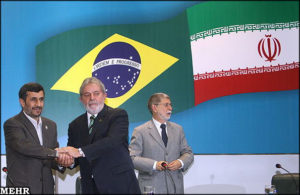
Photo from Payvand Iran News
It should not surprise anyone that President Lula’s foreign policy would come under greater scrutiny during an election year to determine his successor. What is shocking is the stark contrast between the government’s foreign policy to restore democratic rule in Tegucigalpa while rolling out the red carpet for the questionable President of Iran, Mahmoud Ahmadinejad.
Most foreign policy observers expected Brazil’s foreign ministry to take an active role against the Honduran coup plotters. A day after Zelaya’s ouster President Lula remarked that the overthrow of democracy in Honduras was a “dangerous precedent” and asked “Does democracy mean that you can remove your president late at night and install another?” Eventually, the Brazilian embassy opened its doors to the deposed Zelaya, but could not close down the events leading up to Honduras’ November 29, 2009 presidential elections which has all but ended the “crisis” and left the Brazilian foreign ministry in a quandry about what to do next.
If Brazil’s foreign policy in Tegucigalpa was clumsy at best, then its management of the Ahmadinejad visit last November amidst Tehran’s ongoing and increasingly brutal crackdown of those protesting his dubious re-election in June of 2009 is getting downright embarrassing.
Remember that both countries announced the cancellation of Ahmadinejad’s planned trip to Brazil last May, a month before the Iranian elections. Also, take into consideration that Ahmadinejad had already traveled to Venezuela, Bolivia, Ecuador, and Nicaragua in search of allies to stem the growing isolation of his government in the context of its program to enrich uranium. No one should be surprised that Iran’s beleaguered president would seek out a photo opportunity with one of the most popular political leaders in the world today, Lula. Nor should we be shocked and amazed that Brazilian commercial interests, in particular Petrobras and those linked to Brazil’s considerable uranium deposits, would seek to invest in Iran, a country with legitimate concerns over its own energy security despite its vast oil reserves. Given the opportunities to produce and refine oil, not to mention Brazil’s aspirations to export enriched uranium for nuclear energy production, Lula’s foreign policy toward Iran is more than expected, but it is the execution that is indeed troubling.
Just last week Brazilian Foreign Minister Celso Amorim is quoted in Brazil’s major daily newspaper, Folha de São Paulo, that the situation in Iran “is not yet extreme” with respect to the expanding repression of the growing line of government dissidents. Of course, among the many governments doing business with Tehran the events are troubling, but that has not stopped their engagement or investments. However, President Lula and Minister Amorim stood up for Honduran democracy at a critical moment without a clear expectation of success. This is admirable, even if the policy did not return on investment. Brazil raised the bar. Yet, Amorim’s comments about Tehran do not square with his position on Teguicigalpa.
It is one thing to engage Tehran, it is another to stand beside the regime’s spokesperson (Ahmadinejad) and imply that not enough blood has been spilled to deserve criticism, or at least caution. Most importantly for Brazil, there are much better advocates of the country’s wish to occupy a permanent seat on the United Nations Security Council than the President of Iran. There are ways of advancing policies of cooperation with Iran, especially with respect to the challenge of energy security, without having to roll out the red, blood stained carpet of presidential diplomacy for Ahmadinejad. Now we will have to see if President Lula and Minister Amorim can clean up their mess.